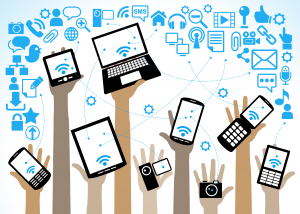
Before technology became such a focus in our lives, our go-to for everything and our ultimate dependence; we actually had to look things up. Like in the library, in encyclopedias and in real life news papers. While technology has made all of that easier for us, has it made us smarter? We literally have all the information in the world at our fingertips through our iPhone, tablet or whichever device we have closest to us. “Does this make our children smarter than we are based on the ability to find information? I know plenty of children that are faster at technology, more efficient and more comfortable with technology than the adults in their lives. This is only because they were born with it.
“Humans today are like most smartphones and tablets – their ability to solve problems depends not on the knowledge they can store but on their capacity to connect to a place where they can retrieve the answer to find a solution. This is what some have labelled the “hyper-link” economy… the only knowledge we need to have is the knowledge of where to find stuff.”- Tomas Chamorro-Premuzic Ph.D
Type any phrase or question into a Google Search engine and it can almost guess exactly what you are trying to request. Then thousands and thousands of possible responses pop right up for you to review. Now, this does take some skill and knowledge about how to find credible sources. Not everything you read on the internet is true. Children have not fully realized that or have the experiences to be able to differentiate that.
“Technology is making us shallower thinkers, multi-tasking, unable to digest speeches, even songs, perpetually flicking”. In response, he says what we need now is creativity and innovation. “We need to think eclectically and daringly,” he says. “The big issue is how to teach creativity. We don’t need to learn facts, to remember stuff is less important, so the nature of professions are shifting; teachers should bear this is mind. As stated by Andrew Keen author of The Internet is Not the Answer.
Now, does this access to information bring us more knowledge to keep, ponder and elaborate on? Or does it merely provide access whenever we need it? Students in my class, with computers at their fingertips, are likely to google the assignment before they attempt it. I have seen it happen. We go over a lesson, we discuss, we review, all the good classroom stuff. I feel like they get it. There is good conversation. Wow, I feel like a great teacher today. Boom, they sit down at the computers and some of them will just search for the assignment online to see if the answers are there or if someone else has posted them. Some would say it is just laziness. Some would just say it is their go-to method of finding out information. I have experienced students spend their entire work time looking for the answers online and they are likely to know the answers easily if they just did it. Being aware of their methods of understanding is a role that education is looking at and changing to meet these new learners needs. I, for one, am excited to be apart of that change.
Roberts, G. (2015, July 16). Google Effect: is technology making us stupid? Retrieved July 07, 2017, from http://www.independent.co.uk/life-style/gadgets-and-tech/features/google-effect-is-technology-making-us-stupid-10391564.html
Is Technology Making Us Stupid (and Smarter)? (2013, May 07). Retrieved July 07, 2017, from https://www.psychologytoday.com/blog/mr-personality/201305/is-technology-making-us-stupid-and-smarter